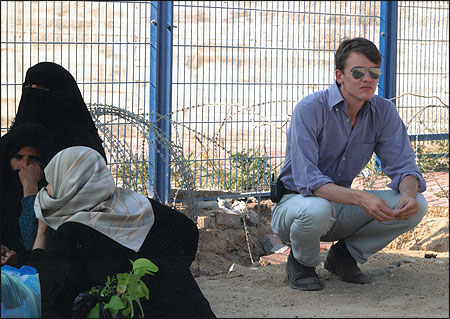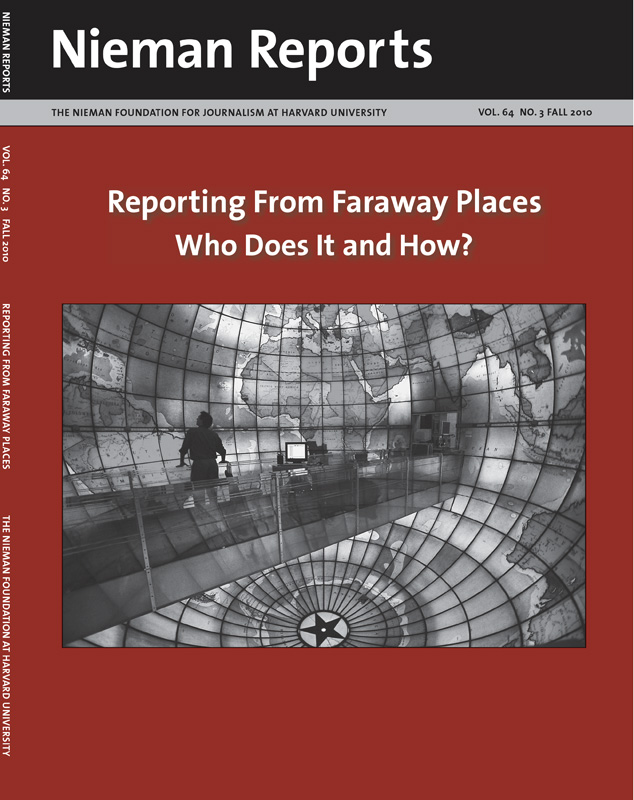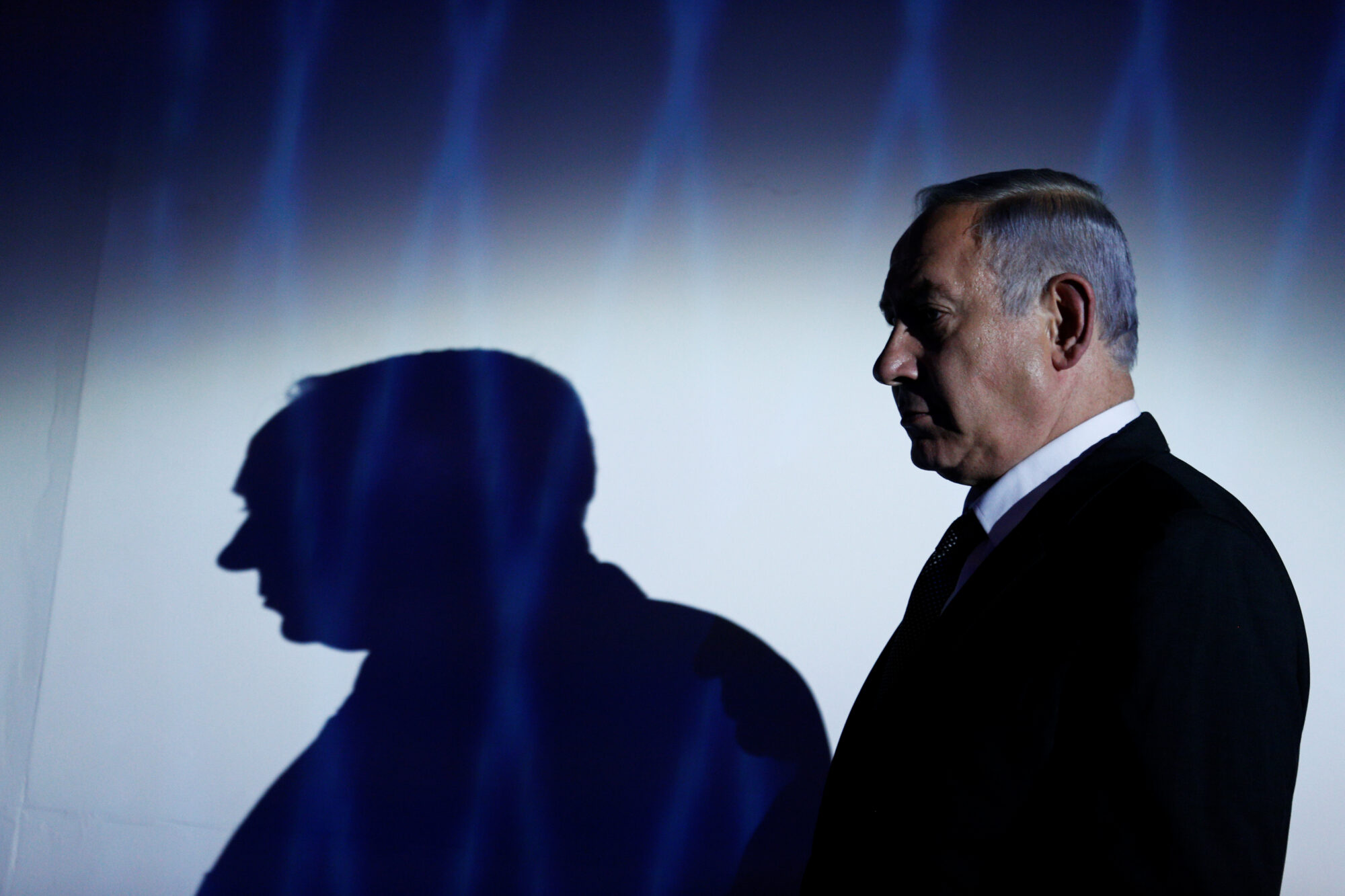
In May, BBC News correspondent James Reynolds delivered the Bernard D. Nossiter ’47 Lecture at Dartmouth College. Reynolds, a 2010 Nieman Fellow, has been based in South America, China, the United States, and Great Britain as well as the Middle East. Here is an edited version of his talk, entitled “Stuff Them or Shoot Them? The Future of the Foreign Correspondent.”
Foreign correspondents. We are basically a pain in the neck. We cause our editors endless amounts of grief with our annoying habit of getting arrested and kidnapped. Foreign governments would prefer us to pack up and go home. Many people—perhaps some of you—think that we spend our time lounging by the pool in safari suits drinking gin and tonics, relics of an antiquated era. But I want to argue that it’s worth keeping us around for a while longer.
Journalism is unlike law or medicine. No one is required to pass an exam before doing the job and there is no such thing as a license for foreign correspondents. Wake up one morning and buy a plane ticket, pack a computer, and become one. Or write home from a trip abroad and you’re doing a basic form of foreign corresponding. So if all of us can do this, then those of us who do it for a living need to explain clearly the benefit that derives from having a special tribe of paid foreign correspondents.
Put simply, we need foreign correspondents for reasons similar to why we journalists are essential—so that we don’t live in the dark. Foreign correspondents help us understand the world by shedding light on places where our fellow citizens are engaged in wars and on people and governments whose decisions absolutely affect our lives.
But here’s the problem. This job costs money, and in the old way of doing it, the cost to news organizations was considerable. I’m told that a foreign bureau for a U.S. newspaper costs around a quarter of a million dollars a year to maintain—much more if it’s in a war zone. Consequently, many U.S. newspapers, including The (Baltimore) Sun and The Boston Globe no longer have any foreign bureaus.
Click here for an interactive map of BBC correspondents »The BBC, where I work, has seven large foreign news bureaus and many smaller ones. Yet we are also under pressure to cut our costs so editors there have come up with new, cheaper ways of getting stories from abroad. In this spirit, I’m going to take a look at three alternatives—the local reporter, the unsupported freelancer, and the multiskilled staffer, as well as some variations on these possibilities.
Local Reporters
RELATED ARTICLE
“Should Local Voices Bring Us Foreign News?”
- Solana LarsenWhy deploy one of your own home reporters at great cost when you can hire a local reporter in a foreign country to do the same job? After all, local reporters know the story, and they’re much cheaper.
In many ways, this can be an exciting step; local reporters as foreign correspondents are often spectacularly successful. In Gaza, Rushdi Abu Alouf and Hamada Abu Qammar have worked behind the scenes for the BBC as a producer and organizer helping incoming teams arrange interviews. In December 2008, Israel carried out an offensive into Gaza to stop Palestinian rocket fire, and its government closed the border so that most foreign correspondents were unable to get into Gaza. Rushdi and Hamada were there so they filed the reports that BBC correspondents would normally file. For the next few weeks they provided clear, lucid and fair-minded coverage of Israel’s offensive in Gaza. They helped me to see the role of a foreign correspondent in a different way.
In Latin America, the BBC has three foreign correspondents: in Sao Paulo, Mexico City, and Buenos Aires. For years, it mostly sent British reporters from London to do these jobs, as they once sent me a decade ago. Now the BBC has hired local correspondents for these posts. I welcome them as colleagues who will give us a fresh perspective on the news from their countries.
In so many ways, it is important for a people to tell their history and their stories. For centuries, many societies and cultures were denied this basic right. Now many see the advent of local reporters as a welcome step toward a post-colonial reporting world.
But there remains enormous value in the view of the outsider. Often, outsiders tell us things about ourselves that we don’t know or fail to notice. Alexis de Tocqueville, a 25-year-old Frenchman, wandered through America and left behind among the most penetrating observations ever made about her people. And while I’ve been in America, I’ve learned a lot about my country, Great Britain, by reading the recent election coverage of reporters such as Anthony Faiola and Dan Balz of The Washington Post who wrote about the campaign for prime minister. I enjoyed their outsiders’ perspective, in particular their comparison of United Kingdom election rallies with American election rallies. Here’s what Balz wrote:
Obama would often speak for 30 or 45 minutes. [Nick] Clegg [the Liberal Democrat leader]’s prepared remarks lasted little more than six minutes. His closing argument was a clarion call for change, but what was most striking was the reserve of the polite audience. Though they whooped at his arrival and when he finished, his best lines were greeted with virtual silence.
Had I been asked to write this article, there’s a very good chance that I would have missed observing the crowd’s reserve; I simply wouldn’t have noticed it because it was so familiar. Catching what the insider takes for granted is one of the ways in which an outsider can provide a fresh perspective.
I want Chinese reporters and Indian reporters to be able to go and report critically on what happens in Britain. I don’t want reporting to be restricted by nationality. I want as many different perspectives as possible. It makes for good journalism and it also makes for a stronger society.
There’s another point to consider: There are some places in which we simply cannot rely on local reporters to get us the story, however much we might want them to. In places where the government firmly controls the media, a person who carries a foreign passport usually has more freedom to tell the story.
From 2006 until 2009, I was the BBC’s China correspondent. When an earthquake in Sichuan province killed as many as 90,000 people, many of them children crushed under collapsed schools, authorities at first allowed all reporters to cover the story. Then things began to get more difficult when parents of these children began to ask tough questions of the government. Soon the Chinese authorities banned coverage by the domestic media of the parents’ campaign. At that point, foreign journalists were the only ones able to continue covering this story. Our Chinese colleagues could not report for their own publications, nor could they report for ours given that a law prevents Chinese citizens from having bylined reports in foreign news publications.
To return to Gaza, though local reporters do much of the finest reporting in that region (Palestinians in Gaza and the West Bank, and Israelis in Israel), Israeli restrictions mean that Palestinian reporters in Gaza are not allowed to cover the Israeli side of the story nor are Israeli reporters allowed into Gaza to report. The only reporters who can routinely tell both sides of the story are foreign correspondents, who can compare an Israeli air strike in Gaza City one day to a Hamas rocket strike on an Israeli town another day. This ability to be on the ground on either side allows us to report from various perspectives, and this adds immeasurably to the depth of coverage we can provide.
While I welcome the advent of more local reporters providing foreign news coverage, there is still a need for the outsider as foreign correspondent.
Unsupported Freelancers
Why should news organizations send staff correspondents when unsupported freelancers will do the same job for a lot less money?
There is a great attraction to having freelancers gather foreign news. At the core of every reporter is that instinct to get up and go and to try to make a name by taking risks and being bold. To some extent, it’s always been this way but never has the opportunity been there as it is today. A young journalist with a laptop, mobile phone, and a camera can pick a country and start to ask questions and take photos and there’s a strong chance that in time news organizations will take those reports.
Despite the appeal this has, we should be careful about going too far down this path. News organizations have a responsibility of care for those whose work they publish. This duty costs money. The BBC takes this responsibility very seriously. Before the BBC deploys any of its reporters to a conflict zone, it pays for us to go on a six-day hostile-environment training course, usually held in the British countryside. Former soldiers teach basic battlefield first aid, how to deal with gunfire, and what to do if kidnapped. We go on refresher courses every three years. Whenever we come back from a war zone, we’re offered free trauma counseling. This all costs money. But it means that when I go into Baghdad or Gaza, I’m prepared, well protected, and well cared for if anything goes wrong.
In 2007, a local militia in Gaza City kidnapped Alan Johnston, the BBC’s Gaza correspondent. During his captivity the BBC supported his family, negotiated with various governments, and organized a successful public and private campaign for his release. David Rohde, a correspondent with The New York Times, was kidnapped in Afghanistan in 2008; The Times supported his family and kept lines of communication open with Afghan and American officials until he escaped and came home safely.
Johnston and Rohde received comprehensive support from their organizations. What would have happened had either of them been a freelance contributor?
We need to be wary of allowing the creation of two classes of foreign correspondents—on the one hand staff correspondents who receive proper training and support from their news organizations and on the other hand an army of young freelancers, stringers and guest contributors who are asked to do the same job but without the same level of support.
A friend of mine is a foreign correspondent in Mexico. She has freelance colleagues who routinely report on the drug war in the north of the country, one of the most dangerous assignments in the world.
“How does it work before they go?” I asked her. “Do they speak on the phone to people at the organizations they’re going to file for to clarify what happens if they get injured or what kind of risks they should take?”
“That conversation almost never happens,” my friend told me. “It is a gray area.”
It shouldn’t be. We should not be quietly allowing dangerous news stories to be gathered by those with no support—simply because it’s cheaper to do it that way. There is plenty of need for daring, talented reporters who want to work as foreign correspondents and who are intrepid enough to do the job on their own. But all of us need to think through the consequences of what it means to take that reporter’s work without offering proper training and protection.
Multiskilled Staffer
So far the choice seems to be between the lumbering, expensive staff correspondent and the cheap, mobile-enhanced freelancer. But there is an alternative combining the best of each—the training and support of a staff correspondent and the agility of a freelancer into what I call the multiskilled staffer.
Given my BBC orientation, I believe strongly that foreign correspondents, both staffers and freelancers, should know at least the basics of camera work, editing and radio recording. To have all of these skills is now essential to get a job as a foreign correspondent—and to keep it. I ought to know, since even in my first foreign posting in South America, my bureau was so small that I was it. The deal I made with my bosses was that I would have to do pretty much everything myself; it was cheaper this way. So if I wanted to do a TV story, I would have to go and film it myself.
I’ll never forget an interview I did with the Chilean foreign minister at the rather grand Foreign Ministry building in Santiago, Chile. The minister came in and sat down, and when he saw me setting up the camera he assumed that I was the cameraman.
“Where’s the correspondent?” he asked me.
“I’m the correspondent,” I replied.
His expression showed his shock; he’d never heard of a cameraman/correspondent before. He didn’t know how it would work. Nor did I. So I sat next to the camera, and when I asked him a question and he started to respond, I would jump out of my chair to look through the viewfinder to be sure his face was still in the shot. I’d call this a reasonably stressful way of carrying out an interview, but we got it done.
Today this is how it works in the BBC’s many smaller foreign bureaus; one person does everything. During my years as the BBC’s South America correspondent, I often went with a video camera in one hand, a minidisc radio recorder in the other, and a digital stills camera round my neck. Sometimes, when I was traveling, I would hire a taxi driver for the day and then recruit him as my camera assistant; I’d ask him to shoot what we call the piece-to-camera, the bit when I’d speak to the camera. Many of these drivers really enjoyed doing this, and we did some good work together.
In taking this approach, the BBC has plenty of company. In 2007, ABC News set up seven one-person foreign bureaus from South America to Southeast Asia. A lot less expensive than what bureaus used to be, the news organizations get to cover more foreign stories.
But this also comes with a word of caution. Multiskilling has its limits so there are times when having more than one person in a bureau is critical, and here are three reasons why:
Breaking News: Sometimes when the news breaks, there’s simply too much to do on your own. At any one time, the BBC may have five or six news shows broadcasting. At the busiest times, all of them will want stories, features and news updates. The best way to divide the workload is still the old-fashioned one—a reporter writes the scripts, a camera operator does the filming, and a producer does the organizing. It can be the only way to get the job done.
Quality: Someone who is a great writer and reporter is not always a great cameraman, just as the person who takes remarkable photographs is not always going to be able to write a compelling article. If we strive for excellence in our industry, then we need to reserve space at the top of our profession for such specialists—those people whose work takes our breath away.
Safety: In a conflict zone, reporters are safer when they have someone with them; being with someone else can save your life.
Paying for Foreign News
So how is this paid for? Since I’m not the one paying (as neither an editor nor publisher, entrepreneur or venture capitalist), I can’t pretend to know the answers about money. I do know that some news organizations remain committed to foreign news coverage, and I am fortunate that the BBC is among them. Earlier in May, Mark Thompson, BBC director-general, gave a speech about the organization’s international role and when he spoke about Afghanistan, for example, he said, “We’re in it for the long term. We’ve been in Afghanistan for decades and intend to be there for decades to come—whether Western forces are still present or not.”
RELATED ARTICLES
“Foreign Reporting: It's Not Like It Used to Be”
- John Schidlovsky, Director, IRP
“The Sometimes Bumpy Nonprofit Ride Into Foreign Correspondence”
- Jon Sawyer, Director, Pulitzer Center
“Africa—Revealed on GlobalPost Through People-Oriented Stories”
- Andrew Meldrum, Senior Editor, GlobalPostOther news organizations, for a variety of reasons, cannot offer that same commitment so I want to point out a few examples of other ways of paying for foreign news coverage:
Fellowships and Foundations: Several of these provide vital new ways of funding foreign reporting. The nonprofit International Reporting Project (IRP), founded in 1998, tries to fill the gap left by newspapers and broadcasters. And the Pulitzer Center on Crisis Reporting funds foreign reporting projects. In addition, the Overseas Press Club Foundation offers fellowships to students who want to report from abroad.
Digital Start-ups: Founded in 2009, the Web-only publication GlobalPost has a network of more than 50 correspondents that provides news coverage from around the world. Using a different approach, Global Voices Online conveys to an international audience the words of bloggers and citizen media from around the world.
None of us can know what the future holds—or which of these models (or combination of models) will work to sustain foreign news reporting. I believe strongly and passionately that there remains a vital and viable role for the foreign correspondent, just as there is much to be gained from local reporters explaining their country to foreigners. Similarly, I see great promise in the energy and multimedia talent of young reporters as they experiment with telling these stories on digital platforms. Yet through all of these times of transition, my hope remains that we never forget the power words have to transmit across our national boundaries the experiences of a foreign people.



